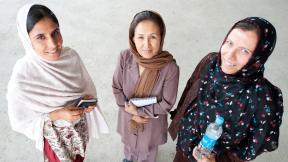
It has hit most of us very hard. From crushing news of mounting infections and deaths to emotional breakdown; from digital fatigue to social isolation; depression to job loss; business bankruptcy to physical health deterioration; spousal conflicts to children’s boredom; from screen addiction to diminishing human connection.
“When will it end?” is a question on everyone’s mind. Some of us are giving up hope. Others are experiencing “pandemic fatigue”, resulting in a carefree attitude. As the pandemic wears on, some are no longer interested in taking the necessary safety precautions, which may endanger not only their own health and lives, but also those of others. Of course, conspiracy theories don’t help to curb negative thoughts and destructive behaviours.
While it may seem natural to become depressed, anxious, pessimistic or even an outright anti-masker as the pandemic lockdown takes its toll on us, it’s crucial for us to devise our coping strategies.
It’s time for a radical mind shift. It’s time for us to reframe our challenges. It’s time for us to rethink our blessings.
Practicing Shukr (Gratitude) During the Pandemic
" And whoever is grateful, he is only grateful for the benefit of his own self."
(Quran 31:12)
1. Gratitude enhances your immune system. A few studies have shown an improvement in immunity among those who regularly practice gratitude. Considering that COVID-19 typically affects those with lower or compromised immunity worse than others, having a stronger immune system can help you fight off the virus faster at the least.
2. Gratitude is good for your mental health. Studies have also revealed the impact of positive and thankful emotions on one’s mental health. A grateful mind and heart ease the stress hormones and help one curb their negative emotions. An attitude of gratitude may be your key to overcoming the pandemic burnout.
3. Gratitude helps you appreciate life’s simple pleasures. One thing most of us have come to appreciate during the pandemic is the simple joys of life that we took for granted for years: a hike in the park, strolling in your neighbourhood, riding a bike, playing with your kids, mindfulness, praying as a family, cooking a hearty meal for yourself and your family, watching a movie with kids, reading to stimulate your mind, and calling or zooming with your loved ones (as opposed to WhatsApping, texting, or social media messaging). The more we are thankful to God for these beautiful blessings during the pandemic, the more we will be blessed with such opportunities.
4. Gratitude energizes you and others. A simple heartfelt “thank you” can make someone’s day. A call to express gratefulness to someone for a favour can lift the spirits of a demoralized soul. A note of gratitude to a loved one can evoke a bright smile on a gloomy and fatigued face. But the impact of gratitude is not just on the receiver but also on the giver. You are in fact the first beneficiary of the boost of hope, joy, and satisfaction that an expression of Shukr (gratefulness) produces. More than ever, during this prolonged pandemic, sharing words and gestures of thankfulness with loved ones as well as strangers is in order - for your own mental and spiritual energy first.
5. Gratitude creates connection, collaboration, and community. When you recognize someone’s favour it builds a reciprocal relationship. When you appreciate someone’s time or advice, you don’t only reinforce a positive behaviour, but you encourage them to do more for you in the future. Moreover, you will naturally return a favour with something similar or better. Gratitude creates a beautiful cycle of affection, solidarity, and service. This is what community building is all about, which has been minimized during the pandemic given the physical limitations of the lockdown. However, with your deliberate actions of generosity and volunteerism during the pandemic, be it virtual or physical, you are able to develop new connections and communities.
As we have learned since the beginning of the pandemic, we need the entire community of selfless people to fight this pandemic. We are not in it alone.
It’s easy to give up. It’s hard not to be overcome by pandemic fatigue. It’s tempting to drop our guard.
“He does not understand religion properly who does not count affliction as a blessing and ease as a trial"
- Sufyan al-Thawri, a famous early scholar of Islam.
Let’s use the power of Shukr or gratitude to bounce back as resilient people and communities, insha Allah (God willing).
Read this article for some ideas to practice gratitude: “18 ways to achieve greatness through gratefulness” .








Add new comment